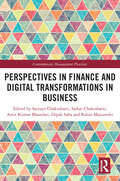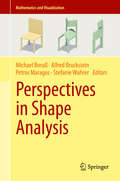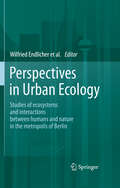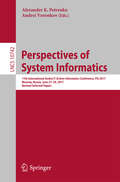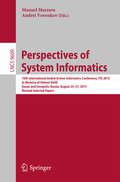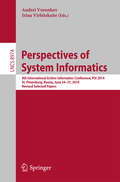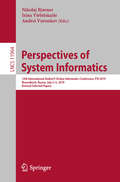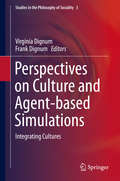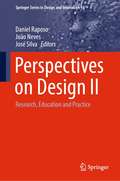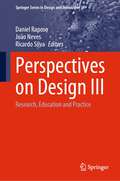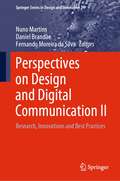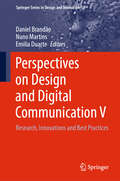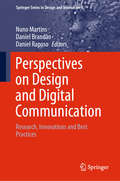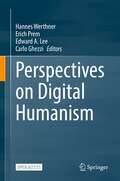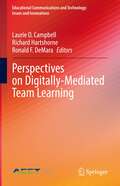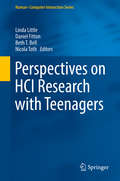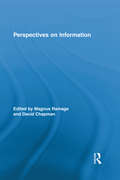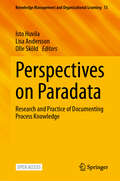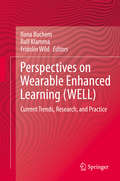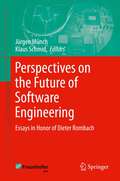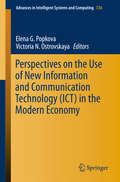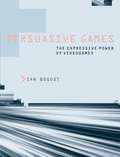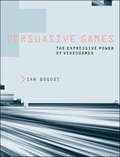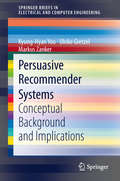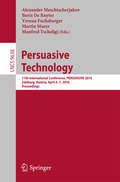- Table View
- List View
Perspectives in Finance and Digital Transformations in Business (Contemporary Management Practices)
by Satyajit Chakrabarti, Saikat Chakrabarti, Amit Kumar Bhandari, Dipak Saha and Rabin MazumderThis book presents different perspectives in finance and the adoption of digital tools in business in India.It discusses key issues in strategy, organisation, and management for businesses focussing on practical and actionable guidance and innovative tools which offer insights into the formulation and implementation of effective strategies and solutions. The book also looks at the adoption of new digital tools and strategies in different areas of business and management and ways in which these tools can be employed in business analysis, strategy, risk assessment, and management. It presents an overview of the application of new technologies in the industrial, banking, corporate, and agriculture sectors, among others, all aimed at increasing performance and profitability, assessing financial risk and volatility, and improving customer and employee experience.Part of the Contemporary Management Practices series, this book will be useful to practicing managers, researchers, and students who are interested in business and financial strategy, social inclusion, e-business, social entrepreneurship, information management, finance, and banking.
Perspectives in Shape Analysis
by Alfred Bruckstein Michael Breuß Petros Maragos Stefanie WuhrerThis book presents recent advances in the field of shape analysis. Written by experts in the fields of continuous-scale shape analysis, discrete shape analysis and sparsity, and numerical computing who hail from different communities, it provides a unique view of the topic from a broad range of perspectives. Over the last decade, it has become increasingly affordable to digitize shape information at high resolution. Yet analyzing and processing this data remains challenging because of the large amount of data involved, and because modern applications such as human-computer interaction require real-time processing. Meeting these challenges requires interdisciplinary approaches that combine concepts from a variety of research areas, including numerical computing, differential geometry, deformable shape modeling, sparse data representation, and machine learning. On the algorithmic side, many shape analysis tasks are modeled using partial differential equations, which can be solved using tools from the field of numerical computing. The fields of differential geometry and deformable shape modeling have recently begun to influence shape analysis methods. Furthermore, tools from the field of sparse representations, which aim to describe input data using a compressible representation with respect to a set of carefully selected basic elements, have the potential to significantly reduce the amount of data that needs to be processed in shape analysis tasks. The related field of machine learning offers similar potential. The goal of the Dagstuhl Seminar on New Perspectives in Shape Analysis held in February 2014 was to address these challenges with the help of the latest tools related to geometric, algorithmic and numerical concepts and to bring together researchers at the forefront of shape analysis who can work together to identify open problems and novel solutions. The book resulting from this seminar will appeal to researchers in the field of shape analysis, image and vision, from those who want to become more familiar with the field, to experts interested in learning about the latest advances.
Perspectives in Urban Ecology
by Wilfried EndlicherThis book gives an interdisciplinary overview on urban ecology. Basic understanding of urban nature development and its social reception are discussed for the European Metropolitan Area of Berlin. Furthermore, we investigate specific consequences for the environment, nature and the quality of life for city dwellers due to profound changes such as climate change and the demographic and economic developments associated with the phenomena of shrinking cities. Actual problems of urban ecology should be discussed not only in terms of natural dimensions such as atmosphere, biosphere, pedosphere and hydrosphere but also in terms of social and cultural dimensions such as urban planning, residence and recreation, traffic and mobility and economic values. Our research findings focus on streets, new urban landscapes, intermediate use of brown fields and the relationships between urban nature and the well-being of city dwellers. Finally, the book provides a contribution to the international discussion on urban ecology.
Perspectives of System Informatics
by Andrei Voronkov Alexander K. PetrenkoThis book constitutes the thoroughly refereed post-conference proceedings of the 6th International Andrei Ershov Memorial Conference, PSI 2006, held in Akademgorodok, Novosibirsk, Russia in June 2006. The 30 revised full papers and 10 revised short papers presented together with 5 invited papers address all current aspects of theoretical computer science, programming methodology, and new information technologies.
Perspectives of System Informatics
by Manuel Mazzara Andrei VoronkovThis book constitutes the refereed proceedings of the 10th International Andrei Ershov Informatics Conference, PSI 2015, held in Kazan and Innopolis, Russia, in August 2015. The 2 invited and 23 full papers presented in this volume were carefully reviewed and selected from 56 submissions. The papers cover various topics related to the foundations of program and system development and analysis, programming methodology and software engineering and information technologies.
Perspectives of System Informatics
by Andrei Voronkov Irina VirbitskaiteThis book contains the thoroughly refereed papers from the 9th International Ershov Informatics Conference, PSI 2014, held in St. Petersburg, Russia, in June 2014. The 17 revised full papers, 11 revised short papers, and 2 system and experimental papers presented in this book were carefully reviewed and selected from 80 submissions. The volume also contains 5 keynote talks which cover a range of hot topics in computer science and informatics. The papers cover various topics related to the foundations of program and system development and analysis, programming methodology and software engineering and information technologies.
Perspectives of System Informatics: 12th International Andrei P. Ershov Informatics Conference, PSI 2019, Novosibirsk, Russia, July 2–5, 2019, Revised Selected Papers (Lecture Notes in Computer Science #11964)
by Nikolaj Bjørner Andrei Voronkov Irina VirbitskaiteThis book constitutes the refereed proceedings of the 12th International Andrei P. Ershov Informatics Conference, PSI 2019, held in Novosibirsk, Russia, in July 2019.The 18 full papers and 3 short papers presented in this volume were carefully reviewed and selected from 70 submissions. The papers cover various topics related to the Mathematics of Computing, Information Systems, Formal Languages, dependable and fault-tolerant Systems and Network, Automata Theory, and much more.
Perspectives on Culture and Agent-based Simulations
by Virginia Dignum Frank DignumThis volume analyses, from a computational point of view, how culture may arise, develop and evolve through time. The four sections in this book examine and analyse the modelling of culture, group and organisation culture, culture simulation, and culture-sensitive technology design. Different research disciplines have different perspectives on culture, making it difficult to compare and integrate different concepts and models of culture. By taking a computational perspective this book nevertheless enables the integration of concepts that play a role in culture, even though they might originate from different disciplines. Culture is usually regarded as something vague and qualitative and thus difficult to deal with in a computational and formal setting. Taking a computational approach to culture thus encompasses a twofold risk: taking a too simplistic approach to cultural influence on behaviour; or trying to capture too much, hence not leading to useful computational tools. However, the approaches and insights in this collection show how different perspectives by leading researchers described in thirteen chapters still can form a coherent picture. The book thus illustrates the potential of using computing systems to better understand culture. By describing methods, theories and concrete application results about the integration of cultural aspects into computer systems, this book provides inspiration to researchers of all disciplines alike and presents the start of an interdisciplinary dialogue on culture.
Perspectives on Design II: Research, Education and Practice (Springer Series in Design and Innovation #16)
by José Silva Daniel Raposo João NevesThis book reports on interdisciplinary research and practices in communication, interior, fashion and product design, highlighting strategies for systematizing the design approach in a global, digital world. It gathers a selection of chapters written by the authors of the best articles presented at the 7th EIMAD conference, held online on May 14–15, 2020, from Portugal. The works were chosen for their particular link to contemporary concerns in terms of identity, health and well-being, social inclusion, sustainability, education and environment and, among others. They cover and bridges between important aspects of design education, research and practice, as well as creativity and emerging technology, offering a timely perspective and a source of inspiration to researchers, professionals and educators in design, product development and related fields.
Perspectives on Design III: Research, Education and Practice (Springer Series in Design and Innovation #34)
by Daniel Raposo João Neves Ricardo SilvaThis book reports on interdisciplinary research and practices in communication, fashion, product, and interior design, highlighting strategies for systematizing the design approach in a global and digital world. It gathers a selection of chapters written by the authors of the best articles presented at the 8th EIMAD conference, on July 07–08, 2022, Portugal. This chapters were chosen considering their particular link to contemporary concerns and challenges, considering the design contribution to health and well-being, social inclusion, sustainable development, design education, and environment and, among others. They cover and bridges between important aspects of design education, research, and practice, as well as creativity and emerging technology, offering a timely perspective and a source of inspiration to researchers, professionals and educators in design, product development and related fields.
Perspectives on Design and Digital Communication II: Research, Innovations and Best Practices (Springer Series in Design and Innovation #14)
by Fernando Moreira da Silva Nuno Martins Daniel BrandãoThis book gathers new empirical findings fostering advances in the areas of digital and communication design, web, multimedia and motion design, graphic design, branding, and related ones. It includes original contributions by authoritative authors based on the best papers presented at the 4th International Conference on Digital Design and Communication, Digicom 2020, together with some invited chapters written by leading international researchers. They report on innovative design strategies supporting communication in a global, digital world, and addressing, at the same time, key individual and societal needs. This book is intended to offer a timely snapshot of technologies, trends and challenges in the area of design, communication and branding, and a bridge connecting researchers and professionals of different disciplines, such as graphic design, digital communication, corporate, UI Design and UX design.
Perspectives on Design and Digital Communication V: Research, Innovations and Best Practices (Springer Series in Design and Innovation #50)
by Nuno Martins Daniel Brandão Emilia DuarteThis book gathers new empirical findings fostering advances in the areas of digital and communication design, web, multimedia and motion design, graphic design, branding, and related ones. It includes original contributions by authoritative authors based on the best papers presented at the 7th International Conference on Digital Design and Communication, Digicom 2023, together with some invited chapters written by leading international researchers. They report on innovative design strategies supporting communication in a global, digital world, and addressing, at the same time, key individual and societal needs. This book is intended to offer a timely snapshot of technologies, trends and challenges in the area of design, communication and branding, and a bridge connecting researchers and professionals of different disciplines, such as graphic design, digital communication, corporate, UI Design and UX design.
Perspectives on Design and Digital Communication: Research, Innovations and Best Practices (Springer Series in Design and Innovation #8)
by Daniel Raposo Nuno Martins Daniel BrandãoThis book shares new research findings and practical lessons learned that will foster advances in digital design, communication design, web, multimedia and motion design, graphic design and branding, and other related areas. It gathers the best papers presented at the 3rd International Conference on Digital Design and Communication, DIGICOM 2019, held on November 15–16, 2019, in Barcelos, Portugal. The respective contributions highlight new theoretical perspectives and practical research directions in design and communication, aimed at promoting their use in a global, digital world. The book offers a timely guide and a source of inspiration for designers of all kinds (Graphic, Digital, Web, UI & UX Design and Social Media), for researchers, advertisers, artists, entrepreneurs, and brand or corporate communication managers, and for teachers and advanced students.
Perspectives on Digital Humanism
by Hannes Werthner Carlo Ghezzi Edward A. Lee Erich PremThis open access book aims to set an agenda for research and action in the field of Digital Humanism through short essays written by selected thinkers from a variety of disciplines, including computer science, philosophy, education, law, economics, history, anthropology, political science, and sociology. This initiative emerged from the Vienna Manifesto on Digital Humanism and the associated lecture series. Digital Humanism deals with the complex relationships between people and machines in digital times. It acknowledges the potential of information technology. At the same time, it points to societal threats such as privacy violations and ethical concerns around artificial intelligence, automation and loss of jobs, ongoing monopolization on the Web, and sovereignty. Digital Humanism aims to address these topics with a sense of urgency but with a constructive mindset. The book argues for a Digital Humanism that analyses and, most importantly, influences the complex interplay of technology and humankind toward a better society and life while fully respecting universal human rights. It is a call to shaping technologies in accordance with human values and needs.
Perspectives on Digitally-Mediated Team Learning (Educational Communications and Technology: Issues and Innovations)
by Laurie O. Campbell Richard Hartshorne Ronald F. DeMaraThis book explores technology-supported andragogical and pedagogical approaches that facilitate teamwork, collaboration, communication, and problem-solving opportunities in diverse disciplines. Collaboration and communication skills are not typically developed in traditional STEM instructional practices.The purpose of the book includes expanding the learning science research base regarding how learning principles and strategies, including structured, collaborative, active, contextual, and engaging instructional settings, can support foundational STEM instruction and improve student interest and achievement. The chapters are classified into three categories: (a) empirical studies exploring the manner in which technology-enabled pedagogical principles and practices facilitate student interest in STEM courses, (b) exploration of logistical factors associated with revisioning STEM education and (c) theoretical underpinnings and literature review of digitally-mediated team learning. The book showcases full-length manuscripts advancing transformative approaches for technology-enhanced team learning within STEM disciplines. Contributions have been sought from interdisciplinary researchers, developers, and educators who engage in the research, development, and practice of adaptable digital environments for highly-effective, rewarding, and scalable team-based and collaborative learning. These include such topics as real-time tools for teams in classroom settings; learning analytics; effective technology-enabled pedagogies; and technology-enabled, collaborative, pedagogical approaches to broaden participation in STEM disciplines. Promising approaches and technologies to advance digitally-mediated team and collaborative learning are explored including learning analytics to form effective learning teams. Further, innovative cyber-assisted observation approaches for diagnostic/assessment observation and interaction with student teams, educational data mining of large volumes of collected data, and leveraging. The book will be of interest to Higher Education Faculty in STEM, Learning Scientist, and K-12 educators and learning coaches.
Perspectives on HCI Research with Teenagers
by Linda Little Daniel Fitton Beth T. Bell Nicola TothTeen Computer Interaction is concerned with the design, evaluation and implementation of technologies for teenagers and with the study of major phenomena surrounding them. It aims to give special consideration to the unique development issues and diversity of this particular user group. Teenagers are possibly the most diverse, dynamic and technologically-aware user group. Working with teenagers can enable researchers to gather valuable insights and opportunities to inform the design and implementation of new technologies. Researchers have now begun to acknowledge that Teen Computer Interaction is a specialised area of HCI and this book brings together some of the best work in this field to-date. The book provides relevant HCI communities with an inclusive account of methods and examples of best practice to inform those working with teenagers in research and design projects. The chapters recount research with teenagers in many different domains and provide many different contributions to the field of Teen Computer Interaction including design methods, models, case studies and ethical considerations. The aim of this book is to provide a solid foundation from which the discipline of Teen Computer Interaction can grow, by providing a valuable resource for those wishing to conduct HCI research with teenagers. Perspectives on HCI Research with Teenagers is aimed at academics, practitioners, designers, researchers and students who are interested in the new and emergent field of Teen Computer Interaction.
Perspectives on Information (Routledge Studies in Library and Information Science)
by Magnus Ramage David ChapmanInformation is everywhere, and defines everything in today's society. Moreover, information is a key concept in a wide range of academic disciplines, from quantum physics to public policy. However, these disciplines all interpret the concept in quite different ways. This book looks at information in several different academic disciplines - cybernetics, ICT, communications theory, semiotics, information systems, library science, linguistics, quantum physics and public policy. Perspectives on Information brings clarity and coherence to different perspectives through promoting information as a unifying concept across the disciplinary spectrum. Though conceived as a contribution to the ongoing conversation between academic disciplines into the nature of information, the deliberately accessible style of this text (reflecting the authors’ backgrounds at The Open University) will be make it valuable for anyone who needs to know something more about information. Given the ubiquity of information in the 21st century, that means everyone.
Perspectives on Paradata: Research and Practice of Documenting Process Knowledge (Knowledge Management and Organizational Learning #13)
by Isto Huvila Lisa Andersson Olle SköldThis open access book examines a rapidly 'datafied' society, reminding us that it is crucial to know what data is about and where it originates. This insight has led to an embryonic stage of new theorizing, empirical research, and the formation of new technologies, standards, practices, and concepts to ensure the availability of adequate 'paradata' – data on the making and processing of data. This edited volume aims to provide a cross-disciplinary overview of perspectives on the concept and phenomenon of paradata and its implications for research and practice.
Perspectives on Wearable Enhanced Learning (WELL): Current Trends, Research, and Practice
by Fridolin Wild Ralf Klamma Ilona BuchemWearable technologies – such as smart glasses, smart watches, smart objects, or smart garments – are potential game-changers, breaking ground and offering new opportunities for learning. These devices are body-worn, equipped with sensors, and integrate ergonomically into everyday activities. With wearable technologies forging new human-computer relations, it is essential to look beyond the current perspective of how technologies may be used to enhance learning. This edited volume,“Perspectives on Wearable Enhanced Learning,” aims to take a multidisciplinary view on wearable enhanced learning and provide a comprehensive overview of current trends, research, and practice in diverse learning contexts including school and work-based learning, higher education, professional development, vocational training, health and healthy aging programs, smart and open learning, and work. This volume features current state of the art wearable enhanced learning and explores how these technologies have begun to mark the transition from the desktop through the mobile to the age of wearable, ubiquitous technology-enhanced learning.
Perspectives on the Future of Software Engineering
by Jürgen Münch Klaus SchmidThe dependence on quality software in all areas of life is what makes software engineering a key discipline for today's society. Thus, over the last few decades it has been increasingly recognized that it is particularly important to demonstrate the value of software engineering methods in real-world environments, a task which is the focus of empirical software engineering. One of the leading protagonists of this discipline worldwide is Prof. Dr. Dr. h.c. Dieter Rombach, who dedicated his entire career to empirical software engineering. For his many important contributions to the field he has received numerous awards and recognitions, including the U.S. National Science Foundation's Presidential Young Investigator Award and the Cross of the Order of Merit of the Federal Republic of Germany. He is a Fellow of both the ACM and the IEEE Computer Society. This book, published in honor of his 60th birthday, is dedicated to Dieter Rombach and his contributions to software engineering in general, as well as to empirical software engineering in particular. This book presents invited contributions from a number of the most internationally renowned software engineering researchers like Victor Basili, Barry Boehm, Manfred Broy, Carlo Ghezzi, Michael Jackson, Leon Osterweil, and, of course, by Dieter Rombach himself. Several key experts from the Fraunhofer IESE, the institute founded and led by Dieter Rombach, also contributed to the book. The contributions summarize some of the most important trends in software engineering today and outline a vision for the future of the field. The book is structured into three main parts. The first part focuses on the classical foundations of software engineering, such as notations, architecture, and processes, while the second addresses empirical software engineering in particular as the core field of Dieter Rombach's contributions. Finally, the third part discusses a broad vision for the future of software engineering.
Perspectives on the Use of New Information and Communication Technology (Advances in Intelligent Systems and Computing #726)
by Elena G. Popkova Victoria N. OstrovskayaThis book includes the best works presented at the scientific and practical conference that took place on February 1, 2018 in Pyatigorsk, Russia on the topic “Perspectives on the use of New Information and Communication Technology (ICT) in the Modern Economy”. The conference was organized by the Institute of Scientific Communications (Volgograd, Russia), the Center for Marketing Initiatives (Stavropol, Russia), and Pyatigorsk State University (Pyatigorsk, Russia).The book present the results of research on the complex new information and communication technologies in the modern economy and law as well as research that explore limits of and opportunities for their usage. The target audience of this book includes undergraduates and postgraduates, university lecturers, experts, and researchers studying various issues concerning the use of new information and communication technologies in modern economies. The book includes research on the following current topics in modern economic science: new challenges and opportunities for establishing information economies under the influence of scientific and technical advances, digital economy as a new vector of development of the modern global economy, economic and legal aspects of using new information and communication technologies in developed and developing countries, priorities of using the new information and communication technologies in modern economies, platforms of communication integration in tourism using new information and communication technologies, and economic and legal managerial aspects and peculiarities of scientific research on the information society.
Persuasive Games
by Ian BogostVideogames are an expressive medium, and a persuasive medium; they represent how real and imagined systems work, and they invite players to interact with those systems and form judgments about them. In this innovative analysis, Ian Bogost examines the way videogames mount arguments and influence players. Drawing on the 2,500-year history of rhetoric, the study of persuasive expression, Bogost analyzes rhetoric's unique function in software in general and videogames in particular. The field of media studies already analyzes visual rhetoric, the art of using imagery and visual representation persuasively. Bogost argues that videogames, thanks to their basic representational mode of procedurality (rule-based representations and interactions), open a new domain for persuasion; they realize a new form of rhetoric. Bogost calls this new form "procedural rhetoric," a type of rhetoric tied to the core affordances of computers: running processes and executing rule-based symbolic manipulation. He argues further that videogames have a unique persuasive power that goes beyond other forms of computational persuasion. Not only can videogames support existing social and cultural positions, but they can also disrupt and change these positions themselves, leading to potentially significant long-term social change. Bogost looks at three areas in which videogame persuasion has already taken form and shows considerable potential: politics, advertising, and learning. Bogost is both an academic researcher and videogame designer, and Persuasive Games reflects both theoretical and a game design goals.
Persuasive Games: The Expressive Power of Videogames
by Ian BogostAn exploration of the way videogames mount arguments and make expressive statements about the world that analyzes their unique persuasive power in terms of their computational properties. Videogames are an expressive medium, and a persuasive medium; they represent how real and imagined systems work, and they invite players to interact with those systems and form judgments about them. In this innovative analysis, Ian Bogost examines the way videogames mount arguments and influence players. Drawing on the 2,500-year history of rhetoric, the study of persuasive expression, Bogost analyzes rhetoric's unique function in software in general and videogames in particular. The field of media studies already analyzes visual rhetoric, the art of using imagery and visual representation persuasively. Bogost argues that videogames, thanks to their basic representational mode of procedurality (rule-based representations and interactions), open a new domain for persuasion; they realize a new form of rhetoric. Bogost calls this new form "procedural rhetoric," a type of rhetoric tied to the core affordances of computers: running processes and executing rule-based symbolic manipulation. He argues further that videogames have a unique persuasive power that goes beyond other forms of computational persuasion. Not only can videogames support existing social and cultural positions, but they can also disrupt and change these positions themselves, leading to potentially significant long-term social change. Bogost looks at three areas in which videogame persuasion has already taken form and shows considerable potential: politics, advertising, and learning.
Persuasive Recommender Systems
by Ulrike Gretzel Kyung-Hyan Yoo Markus ZankerWhether users are likely to accept the recommendations provided by a recommender system is of utmost importance to system designers and the marketers who implement them. By conceptualizing the advice seeking and giving relationship as a fundamentally social process, important avenues for understanding the persuasiveness of recommender systems open up. Specifically, research regarding influential factors in advice seeking relationships, which is abundant in the context of human-human relationships, can provide an important framework for identifying potential influence factors in recommender system context. This book reviews the existing literature on the factors in advice seeking relationships in the context of human-human, human-computer, and human-recommender system interactions. It concludes that many social cues that have been identified as influential in other contexts have yet to be implemented and tested with respect to recommender systems. Implications for recommender system research and design are discussed.
Persuasive Technology
by Alexander Meschtscherjakov Boris De Ruyter Verena Fuchsberger Martin Murer Manfred TscheligiThis book constitutes therefereed proceedings of the 11th International Conference on PersuasiveTechnology, PERSUASIVE 2016, held in Salzburg, Austria, in April 2016. The 27 revised full papers and 3 revised short papers presented were carefullyreviewed and selected from 73 submissions. The papers are grouped in topicalsections on individual differences, theoretical reflections, prevention andmotivation, methods and models, games and gamification, interventions forbehavior change, and design strategies and techniques.
